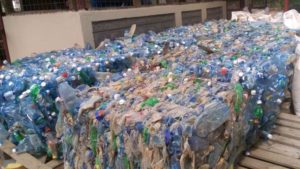One man’s trash…
 Residents of the world’s largest refugee camp have launched an initiative to clean up plastic waste that is also earning them incomes.
Residents of the world’s largest refugee camp have launched an initiative to clean up plastic waste that is also earning them incomes.
Refugees at Dadaab camp, in north-east Kenya, are involved in a recycling pilot project was launched to mitigate waste pollution in the camp while providing livelihood opportunities to refugees and host community members.
Pollution is one of the main problems at Dadaab, which is home to approximately 240,000 refugees and asylum seekers, the vast majority of whom come from Somalia.
The densely populated complex generates a massive amount of waste.
Rubbish is dumped everywhere, burned or buried, creating unhealthy living conditions and environmental degradation.
A lack of an efficient disposal and collection system leads to accumulation of garbage in the environment over time, especially of non-biodegradable waste such as plastic bags and empty jerry cans.
Now, The International Committee of the Red Cross (ICRC) and the Kenyan Red Cross Society (KRCS have backed the program which engages refugees and host community members in plastic waste collection and awareness-raising among the camp population.
Plastic is gathered from camp residents, sorted, pre-processed and then sold to recycling companies in Nairobi.
The pre-processed waste, shredded into granules or bailed, becomes raw material that is reused for other purposes, reducing pollution and the need of extracting primary resources.
The initiative has contributed significantly to the reduction of plastic waste in Dadaab.
Since its launched in November 2016, more than eight tonnes of plastic has been recycled, improving living conditions, generating income and a sense of purpose for workers and participating camp residents.
The project creates a viable environmental solution to the waste problem which communities can continue implementing themselves in the future.
Soon, more collection points will be opened and the workers will receive vocational training on how to run the project to help increase the quantity of plastic gathered and revenue generated.
Laurie Nowell
AMES Australia Senior Journalist












